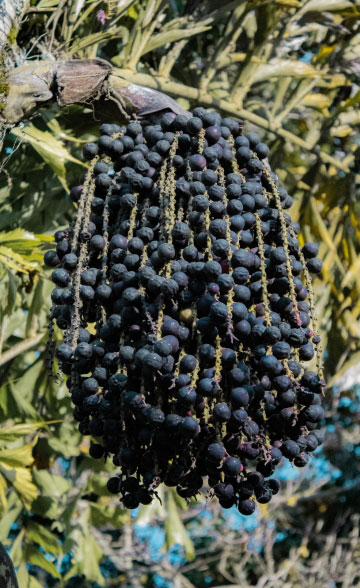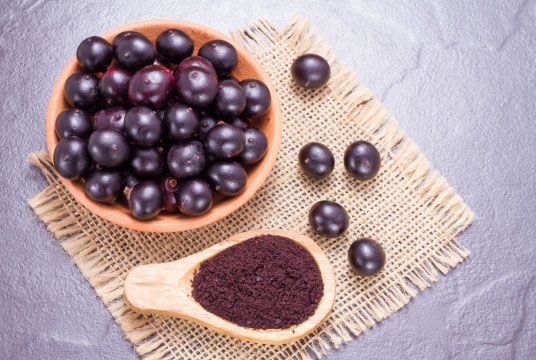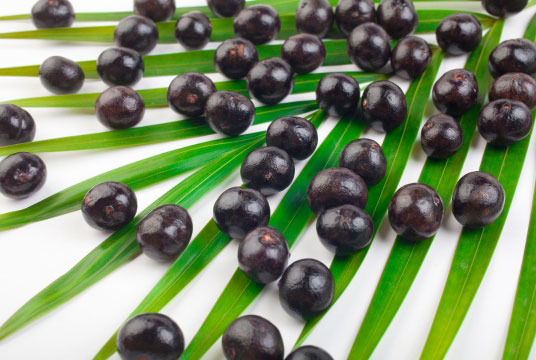
Have you ever wondered if your dog can share the superfood hype, especially regarding acai berries? These little purple powerhouses are known for their health-boosting properties in humans, loaded with antioxidants, fatty acids, and fiber. But before you mix a spoonful into your pup’s dinner, it’s important to pause and consider whether what’s good for us is also safe for our canine companions. In this article, we’ll take a closer look at the potential benefits and risks of introducing acai into your dog’s diet, offering expert insights and practical advice to ensure your furry friend can enjoy this trendy berry, if at all possible, without any complications. Let’s dive into the world of dogs and acai together!
Table of Contents
- What Is Açaí, Anyway?
- Can Dogs Have Acai?
- Acai: The Superfood – Unlocking its Health Benefits
- The Danger of Acai Berry for Dogs
- Why Is Acai Berry Bad For Dogs?
- Can Dogs Be Allergic to Acai?
- Signs of Acai Allergies in Dogs
- How to Safely Incorporate Acai into Your Dog’s Diet?
- Conclusion
What Is Açaí, Anyway?

Acai is a fruit that has become popular in recent years thanks to its nutritional value and its role in Instagram-worthy smoothie bowls. It originates from a tree in Central and South America and is similar in size and texture to grapes. The seed occupies most of the fruit, but the remaining flesh and skin are packed with vitamins and other nutrients, containing only about 70 calories per cup.
Acai has been an important food source for indigenous peoples in the Amazon region for a long time. However, it has been marketed more recently in the United States for its weight loss and anti-aging benefits. However, being wary of products that make unsubstantiated health claims is important. Acai fruit pulp has also been used in medical imaging.
Can Dogs Have Acai?

Yes, dogs can have acai, but only in very small amounts and with certain precautions.
Explanation: Acai berries are not toxic to dogs, but they are typically sold in forms that may not suit your pet. Many acai products, like those found in smoothie bowls or juices, often contain sugar, chocolate, or xylitol additives, which harm dogs. Pure acai berry pulp is the safest form if you offer this to your dog, but even then, it should only be given in small quantities as a treat.
The high antioxidant content in acai could potentially offer some health benefits to dogs, similar to its effects in humans. However, there’s limited research on the specific impacts of acai on canine health. As with any new food, it’s best to introduce acai slowly into your dog’s diet to monitor for any adverse reactions, such as gastrointestinal upset.
Always consult your veterinarian before introducing new foods into your dog’s diet, especially for exotic fruits like acai. They can provide guidance based on your specific dog’s health needs and dietary requirements.
Acai: The Superfood – Unlocking its Health Benefits

Nutritional Profile of Acai
Acai berries boast a remarkable nutritional composition that includes antioxidants, omega fatty acids, amino acids, and dietary fiber. This nutrient-dense fruit is renowned for its high antioxidant levels, particularly anthocyanins, which help combat oxidative stress and free radicals in the body. These nutrients can potentially support skin health, boost immune response, and promote a healthy coat for dogs.
Potential Health Benefits for Dogs
While the specific effects of acai on dogs have not been extensively researched, the general properties of the fruit suggest several potential health benefits:
- Antioxidant Support: The antioxidants in acai may help reduce the damage from free radicals in dogs, potentially reducing inflammation and supporting age-related health.
- Healthy Fats: Acai is rich in omega-9 and omega-6 fatty acids, which can improve the shine and health of a dog’s coat and skin.
- Fiber Content: The dietary fiber found in acai can aid digestion and help maintain a healthy weight by promoting a feeling of fullness.
Cautions and Considerations
Despite its benefits, acai must be given to dogs cautiously:
- Pure Form: Always ensure the acai is pure and free of additives like sugar, chocolate, or xylitol, which are toxic to dogs.
- Allergic Reactions: As with any new food, introduce acai gradually to monitor for any allergic reactions.
- Caloric Content: Keep portions small since acai is relatively high in calories, which can contribute to weight gain if fed in large amounts.
Serving Acai to Your Dog
If you decide to add acai to your dog’s diet, here’s how you can do it safely:
- Consult Your Vet: Before introducing acai, talk to your veterinarian to ensure it’s appropriate for your dog’s diet.
- Start Small: Begin with a small amount to see how your dog reacts.
- Proper Preparation: Serve acai in a pureed form without any additives. Mix it into your dog’s regular food as a supplement, not a replacement.
By understanding and respecting the specific dietary needs of your pet, you can safely explore the benefits of acai for your dog, potentially enhancing their diet with this powerful superfood.
The Danger of Acai Berry for Dogs

Acai berry has been touted as a superfood for humans, but when it comes to dogs, it can be dangerous. While it contains healthy fats, vitamins, fiber, calcium, and antioxidants, theobromine can be toxic to dogs. Below, we will discuss why acai berry is bad for dogs and the risks associated with its consumption.
Theobromine Poisoning: Theobromine is the same compound found in chocolate that is toxic to dogs. Acai berries also contain theobromine, which can cause theobromine poisoning in dogs. Symptoms of theobromine poisoning include vomiting, diarrhea, restlessness, muscle tremors, elevated heart rate, and excessive thirst. In severe cases, it can even lead to seizures, coma, and death.
High in Sugar: Acai berries are also high in sugar, which can cause health problems for dogs, such as obesity and diabetes. Dogs have a digestive system different from humans and cannot process high amounts of sugar. This can lead to weight gain and other health issues.
No Nutritional Benefit: While acai berries may be a superfood for humans, they offer no nutritional benefit for dogs. Dogs have different dietary needs than humans and require a balanced diet that meets their nutritional requirements.
So, acai berries may be healthy for humans but unsafe for dogs. The risks associated with its consumption far outweigh any potential benefits. As a responsible dog owner, it is important to always consult with your veterinarian before introducing new foods into your dog’s diet.
Why Is Acai Berry Bad For Dogs?

Acai berries have gained a reputation as a superfood and are known for their incredible health benefits for humans. Rich in healthy fats, fiber, calcium, vitamin A, and antioxidants, they are often included in a healthy human diet to improve cholesterol levels, promote brain function, and even prevent cancer.
However, despite the potential benefits for humans, acai berries are unsafe for dogs. The culprit is the compound called “theobromine,” which is also found in chocolate and is highly toxic to dogs. Unfortunately, acai berries are rich in theobromine, which can cause serious harm to dogs if consumed in large quantities.
The National Animal Supplement Council (NASC) warns that acai berries should be kept away from dogs due to their high theobromine content. While some may argue that small doses of acai berries are safe for dogs, it is always best to err on the side of caution and consult with a veterinarian.
While it is true that some exotic fruits like goji berries can benefit dogs, acai berries are not one of them. Therefore, it is crucial to avoid feeding your furry friend acai berries and keep them safe from the harmful effects of theobromine. Ultimately, the best action is to prioritize your dog’s health and well-being by discussing dietary concerns with your veterinarian.
Can Dogs Be Allergic to Acai?

Just like humans, dogs can also have allergic reactions to various foods, including acai berries. It’s important to monitor your dog’s reaction when introducing a new food into their diet, especially if it’s not specifically formulated for pets. Acai berries contain compounds such as ficin and ficusin, which have been known to cause allergic reactions in some dogs.
If you notice any signs of an allergic reaction in your dog after giving them acai berries, such as itching, swelling, or difficulty breathing, it’s important to stop giving them the fruit immediately and consult your veterinarian. Your vet can help you determine if your dog is allergic to acai or if there may be another underlying issue.
It’s also important to remember that acai berries should never replace a well-balanced diet specifically formulated for your dog’s nutritional needs. While acai berries contain beneficial nutrients such as antioxidants and fiber, it’s important to consult your vet to determine the best way to incorporate them into your dog’s diet without causing any adverse reactions. As with any new food, it’s always best to gradually introduce acai berries and closely monitor your dog’s reaction.
Signs of Acai Allergies in Dogs
If your dog develops an allergic reaction to acai, it can cause various symptoms.
Some of the signs of acai allergies in dogs include:
Digestive Issues: One of the dogs’ most common signs of acai allergies is digestive problems, such as vomiting and diarrhea. The ficin and ficusin found in acai can irritate the gastrointestinal tract, leading to these symptoms.
Skin Irritation: Acai allergies in dogs can cause skin irritation, such as itching, redness, and inflammation. Some dogs may develop hives or rashes on their skin, which can be uncomfortable and distressing.
Breathing Problems: In severe cases, acai allergies in dogs can cause breathing difficulties. Your dog may wheeze or cough, and in extreme cases, they may experience anaphylactic shock, which can be life-threatening.
Lethargy: Allergic reactions can cause your dog to feel lethargic and weak. If your dog appears uninterested in activities they usually enjoy, it could indicate an allergic reaction.
If you notice these symptoms in your dog after giving them acai berries or any other new food, consult your veterinarian immediately. Your vet can recommend the best course of action, which may include medication or a change in diet.
How to Safely Incorporate Acai into Your Dog’s Diet?
Before incorporating acai berries into your dog’s diet, it is essential to consult with a veterinarian to ensure that it is safe for your dog to consume. If your vet approves, gradually introduce small amounts of acai berries to your dog’s diet. It is recommended to mix acai berries with other foods that your dog already eats to avoid upsetting their stomach. Additionally, ensure that you use fresh, unsweetened acai berries without added sugars or artificial sweeteners. Finally, remember that acai should be considered an occasional treat rather than a regular part of your dog’s diet.
Conclusion
While acai berries offer many health benefits for humans, they should be consumed in moderation by dogs. Understanding the potential risks and consulting with a veterinarian before incorporating any new food into your dog’s diet is essential. Additionally, observing your dog’s reactions and behavior after consuming a new food can help prevent allergic reactions and ensure their safety. With proper precautions and professional guidance, you can safely incorporate acai berries into your dog’s diet and enjoy their many health benefits.



